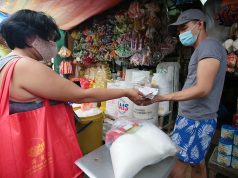Lockdown is last resort amid new COVID-19 variant — NEDA

By Beatrice M. Laforga, Reporter
REIMPOSING a strict lockdown should be the last resort for the government, according to Acting Socioeconomic Planning Secretary Karl Kendrick T. Chua, despite the detection of the highly infectious variant of the coronavirus in the country.
In his presentation at the Junior FINEX (JFINEX) online forum on Thursday, Mr. Chua said the strictest form of lockdown, where 75% of the economy was shut down, caused 23.7 million more people to go hungry, 4.5 million more to slip into poverty, and roughly 2.7 million to lose their jobs.
“The economy is strong enough to recover if we allow it to do so. But our quarantine restrictions prevent the economy from fully recovering and the answer to that is not to give more subsidies but to open the economy more, because all the subsidies will be expensive for the people,” Mr. Chua said during the forum.
With the new coronavirus variant detected in the Philippines, Mr. Chua said the government should continue implementing its health protocols and travel restrictions but avoid reimposing a strict lockdown or only when desperately needed.
“We need to assess the risks around the new variant. It is part of living with the virus. We can prioritize the enforcement of health standards and proactive travel restriction. Higher quarantine should be the last resort,” he said via Viber on Thursday.
Luzon was placed under an enhanced community quarantine (ECQ) from mid-March to end-May, halting nearly all economic activity. As a result, the Philippine economy fell into its first recession in nearly 30 years with a record 16.9% contraction in the second quarter. Economic managers expect gross domestic product (GDP) to have contracted by 8.5-9.5% in 2020. Official GDP data will be out on Jan. 28.
In late December last year, President Rodrigo R. Duterte warned that another lockdown is possible if the new variant, believed to be more contagious, reaches the Philippines.
Presidential Spokesperson Harry L. Roque, Jr. said in a press briefing on Thursday that existing policies will remain in effect while waiting for the decision of Mr. Duterte and the task force for infectious diseases on any new measures that will be adopted to contain the new variant.
For Mr. Chua, who heads the National Economic and Development Authority (NEDA), the state should also make sure that the mass transport is sufficient yet safe, while stimulating consumer demand by allowing family activities.
“I was consulting with the World Bank and based on their analysis, no country keeps their children at home 100% and in a young country like ours, where the median age is 25 years old and 40% of the population is below 20 years old, and if the children are not participating in economic activities, the families are not participating and therefore, up to 50% of total sales and demand are not going to recover. These are all the tradeoffs,” he said.
Meanwhile, Ateneo Center for Economic Research and Development Director Alvin P. Ang said the country could no longer afford another strict lockdown because of its huge impact on the economy.
“We do not have the information to answer that, except that we know we cannot afford another major lockdown. We already know its impact on the economy, they (the government) just have to do very well in contact tracing, isolation, and quarantine,” Mr. Ang said in a Viber message on Thursday.
To avoid further lockdowns, sustained adherence to health protocols even during annual Filipino traditions and festivities is key according to Action for Economic Reforms (AER) Coordinator Filomeno S. Sta. Ana III.
“We all want to avoid another lockdown but to do so, the government and private sector must enforce the rules in physical distancing. It does not help either that officials or influencers themselves are seen by the public as violating the rules,” Mr. Sta Ana said via Viber on Thursday.
STAGGERED RECOVERY
Meanwhile, a possible resurgence in COVID-19 cases poses a great risk to the Philippines’ growth prospects this year.
In a webinar on Thursday, Anwita Basu, who heads the Asia region of Fitch Solutions’ Country Risk department, said the Philippines and Thailand are expected to see “staggered” economic recovery this year.
“Both these countries have badly suffered from the pandemic and are set for fairly staggered recovery. [For the Philippines], along with base effects, the Philippine government is counting on a ramped up fiscal spending to support growth this year, however, the outbreak in the Philippines has been devastating and widespread and so risks to growth remains,” she said.
On Thursday, the Health department reported 1,912 new COVID-19 cases, bringing the total to 494,605.
Fitch Solutions Country Risk & Industry Research revised its 2021 GDP outlook for the Philippines to 7.6% from 6.2% in September on base effects and the expected boost from the larger spending plan of the government.
It said the economy may have shrank by 9.6% last year compared with its previous estimate of a 9.1% slump.



